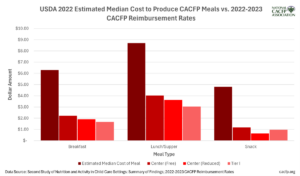Posts Tagged ‘Early Care and Education’
2025-2026 Cash In Lieu Value
The USDA has released the cash-in-lieu value of USDA foods for 2025-2026. The value has increased by half a cent.
Read MoreOutdoor Learning
Whether it’s a walk around the block, a moment in the park, or simply looking out the window, these activities from our partners at Sesame Street in Communities are easy to integrate into daily routines. Together, families and providers can help children notice, wonder, and grow—one outdoor moment at a time.
Read MoreStaying Hydrated in the Summer
Summer is well underway! To prepare children for the heat, ensure drinking water is available and offer it throughout the day as they engage in outdoor playtime. Our partners at the Institute of Child Nutrition provide benefits of drinking water, recommendations for water intake, signs of dehydration, and drinks to avoid.
Read MoreAdvocate for Sufficient CACFP Reimbursement
USDA published the CACFP reimbursement rates for fiscal year 2025-2026. Although the rates have increased, in most instances, reimbursement still remains too low for providers to sufficiently cover the cost of providing meals.
Read MoreAccess NCA Nutrition Education with Head Start Supplemental Funds
Exciting news! Head Start programs have an opportunity to access one-time supplemental funds to support nutrition services and healthy eating for enrolled children and families. You can use this funding for staff training on resources and educational opportunities to help your program improve outcomes for children and families and align with USDA requirements – like the CACFP!
Read MoreQuarterly Policy Update: July 2025
In the last few months, the new USDA administration has begun to make changes that include deregulation and rescission of guidance, as well as a reorganization of USDA structure. USDA has also released reimbursement rates and the second iteration of their Study of Nutrition and Activity in CACFP. During this time, the Office of the President has released it’s Make America Healthy Again Assessment and proposed budget for FY26, both of which could have effects on child nutrition programs.
Read MoreHead Start One-Time Supplemental Nutrition Funds
The Office of Head Start announced that Head Start grant recipients can request supplemental funds to promote nutrition services and healthy eating for enrolled children and families. This funding was created in response to hearing that lack of funding is a barrier to improving or expanding nutrition services in Head Start programs.
Read MoreSecretary Rollins Announces USDA Reorganization
Last week, USDA Secretary Brooke Rollins announced the department’s reorganization plan. Over the next two years, USDA plans to consolidate the FNS Regional Offices from seven to five hubs.
Read More2025-2026 CACFP Reimbursement Rates
The USDA has released the Reimbursement Rates for 2025-2026. Rates are effective from July 1, 2025, through June 30, 2026.
Read MoreCACFP: A Critical Support for Child Care
The CACFP has many benefits – it supports child care providers and ensures that children and adults in care receive nutritious meals. The CACFP is also critical in supporting child care businesses by decreasing costs that can be reallocated towards program improvement, staff wages, or lower tuition rates.
Read More








